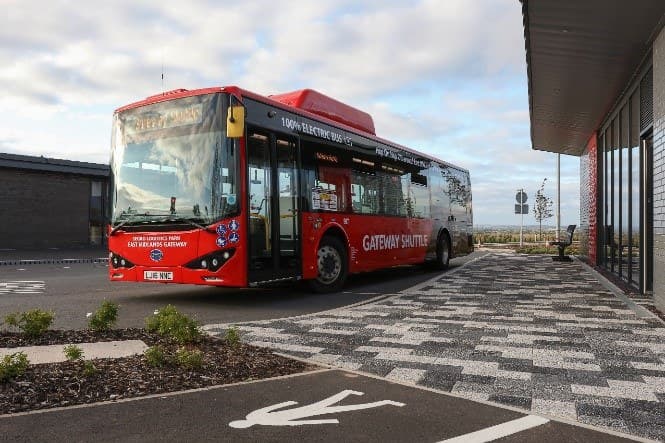
blog: Joining forces to create change at East Midlands Gateway
Wednesday 25th March 2020
SEGRO Logistics Park East Midlands Gateway is a 700-acre development, incorporating a 50-acre strategic rail freight terminal and 6,000,000 sq ft of logistics accommodation, adjacent to East Midlands Airport. The vision for the site was to create a regionally significant employment hub that could be reached without reliance on the private car…but there were several challenges to achieving this:
- The site is 13 miles from the closest cities of Nottingham and Derby,
- It is adjacent to the M1, with excellent road links to said cities and,
- A myriad of shift patterns meant employees would be commuting to the site 24/7
All the above made the prospect of encouraging sustainable travel a challenge!
Our approach has been to work with SEGRO to consider sustainable transport provision at each major phase of development – the application, build, and occupation - and introduce partnership working between the public and private sector to jointly deliver sustainable travel initiatives. The results of our first year’s monitoring are in and they’re showing a positive impact on sustainable transport. Here’s what we’ve been up to…
Preparation & Planning
From 2012 to 2016 ITP worked alongside SEGRO and a team of planners, engineers, architects, and lawyers to develop a Travel Plan and the Public Transport Strategy for the site setting out the infrastructure and the initiatives that would encourage employees to car share, catch the bus or use active travel for the commute. Whilst these planning documents were a requirement for the site, SEGRO and ITP worked collaboratively, consulting with local authorities, transport operators, and the airport to determine the improvements that would need to be made to facilitate sustainable commuting. This early joint working was an important precursor to establishing a Sustainable Transport Working Group to oversee the long-term implementation of the Travel Plan.
The Big Build

The site build started in 2017 and involved strategic upgrades to shared paths from nearby villages, new signalised crossing points, and the closure of roads to vehicles, creating safer and more direct walk/cycle routes to the development and enhanced local connectivity. A high-quality bus interchange with real time information was introduced to improve the experience of commuting by bus and priority signals at traffic lights reduced the potential for delays.
Joint-working with local transport operators led to three high-frequency bus services calling at the site from first occupation and a new on-site electric shuttle bus made it easier and quicker to get around the site.
Welcoming the occupiers
The first occupiers moved on-site in 2019 and securing their buy-in to promote sustainable practices was key to influencing employees’ travel patterns. SEGRO and ITP supported all employers to prepare an Occupier Travel Plan, and provided them with information, incentives, and advice to help promote sustainable travel during their recruitment drives. We found this approach was essential to address early transport concerns that could have been a barrier to employment and embedding sustainable transport practices from the outset.
The positive joint working with stakeholders that started at the application stage led to the establishment of a Sustainable Transport Working Group when the site was occupied.
Chaired by ITP, this group of 18 stakeholders, including the developer, local highways and planning authorities, occupiers, the airport and transport operators, meet bi-annually to discuss the introduction of progressive transport improvements to enable employees to complete the ‘last mile’ of their commute by sustainable modes.
In 2019 this included introducing car sharing initiatives and an electric shuttle bus service. Through partners in the working group we were able to secure additional external funding to introduce two on-site EV bus charging points to enhance the infrastructure provision beyond what would have been possible without the working group. For 2020 our plan is to introduce a new bike hire scheme which again has drawn on the knowledge, experience, and lessons learnt from stakeholders in the group.
What’s the impact?
Results from the employee travel surveys in the opening year show that just 57% of employees are commuting alone in their car, which is 23% less than the target for that year.
Over 107,000 vehicle miles have been saved and 20 tonnes less CO2 being emitted as a result of more people travelling sustainably.
As a profession, by re-thinking the way we deliver sustainable transport initiatives and introducing more collaborative working between public and private sector stakeholders, we can move away from Travel Plans simply being seen as a tick box exercise and move towards the delivery of impactful initiatives that meet the needs of stakeholders and end users.
For more information on the support we can provide for sustainable transport initiatives, please get in touch.
